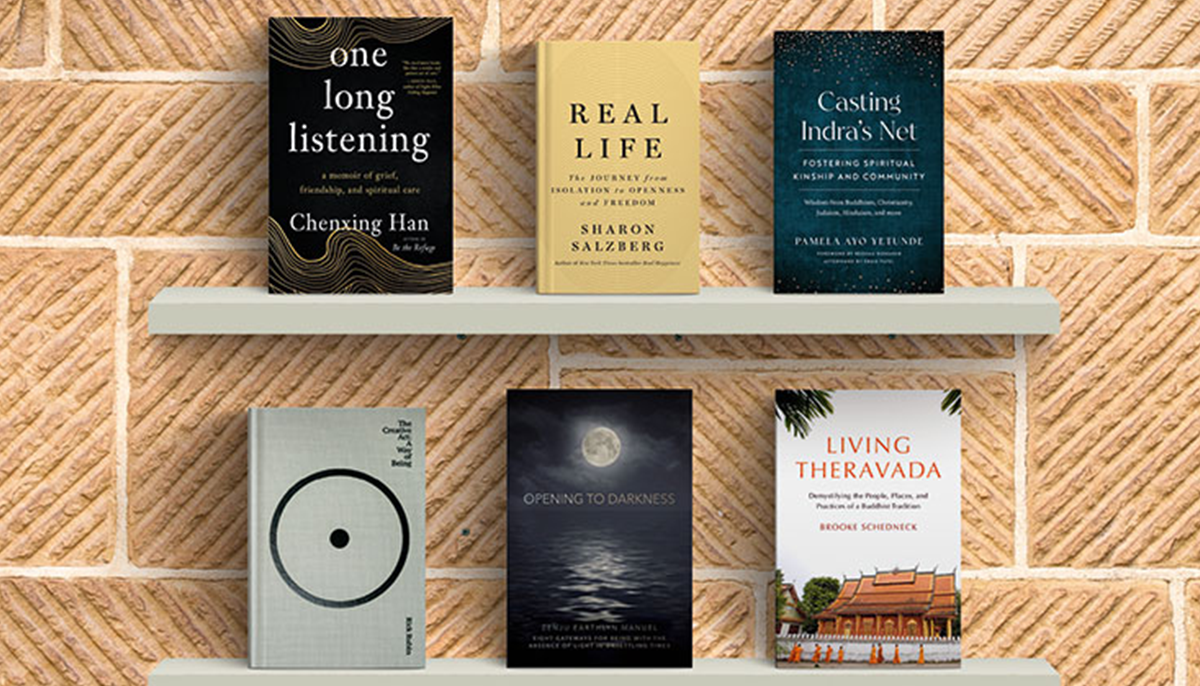Chenxing Han, author of widely acclaimed Be the Refuge: Raising the Voices of Asian American Buddhists, gives us a gorgeous, deeply sensory, and multilingual memoir of life and loss in One Long Listening: A Memoir of Grief, Friendship, and Spiritual Care (North Atlantic Books). Page for page, Han’s story is lucid and clear even as it wanders, resisting linear time, waxing into and waning out of poetry, lists, personal notes, prose, refusing to articulate what is untranslatable, unspeakable, and unknowable—especially, though not only, in spaces of grief. She brings us from a monastery in Taiwan to oncology wards in California, from bedsides of the dying, through childhood memories, and to her own desk, where she muses on what it means to be a Buddhist, chaplain, friend, and daughter. The work is a playful and solemn experiment in form, yet Han’s sincerity and searching spirit remain totally vulnerable and genuine.
Beloved and bestselling author and Buddhist teacher Sharon Salzberg has brought us Real Love, Real Happiness, Real Change… Now, she brings us Real Life: The Journey from Isolation to Openness and Freedom (Flatiron Books). As Salzberg defines it, the opposite of “real life” is living according to small views of anxiety and fear. Real life is expansive, a characteristic we must personify if we’re to live it. One thought experiment, anecdote, and exercise at a time, Salzberg encourages the reader to consider what life would look like if anything were possible. She shows the reader how Buddhist practices of awareness can help a person dare to imagine and get curious about what we otherwise tend to avoid, including other people. Real life, she tells us, is about moving from confinement to freedom, and from humiliation to dignity—and it’s available to everyone.
In Casting Indra’s Net: Fostering Spiritual Kinship and Community (Shambhala Publications), pastoral counselor and Lion’s Roar associate editor Pamela Ayo Yetunde uses the concept of Indra’s net as a metaphor for discussing community in a deeply divided world. A key concept in this book is “mobbery,” a term that Yetunde has coined for a way of being that’s at odds with our better instincts and practices of inclusivity and compassion. Mobbery refers to an aggregation of personal anger into collective anger that develops a power exponentially stronger than that of individuals. That is, it’s using one’s angry energy to find others who are angry and fueling each other. Believing that “mobbery” is on the rise, Yetunde employs tenets of
Buddhism, Daoism, Christianity, Judaism, Islam, and other traditions to loosely interpret and consider it. Ultimately, she sets forth the four noble truths and eightfold path as powerful medicine against mobbery. Yetunde writes that living in a network of communities—in an Indra’s net—comes with responsibilities and opportunities to transform brutality in our lives and in the world.
Rick Rubin, legendary producer of artists from Black Sabbath and Johnny Cash to Adele and Jay-Z, has synthesized a lifetime of wisdom into The Creative Act: A Way of Being (Penguin Press). The book is a nimble, at times wonderfully mysterious and odd embodiment of its fundamental message: that creativity is a way of being and responding to and in the world. The artist’s path isn’t only for the artist, Rubin writes, but for everyone. Creativity is neither rare nor difficult; if you’re human, it’s your birthright. The Buddhist concept of papancha (preponderance of thoughts) refers to the mind’s tendency to respond to experience not spontaneously and creatively, but with an avalanche of mental chatter. It’s this, fundamentally, that can hold us back. Rubin includes an impressive catalogue of practices and reflections for embracing one’s creative path—from beginner’s mind to experimentation, self-awareness, and tuning out undermining voices. There are hundreds of pages of time-tested wisdom here, whether your art is recorded, written, painted, drawn, or invisibly alive in your daily life.
In Opening to Darkness: Eight Gateways for Being with the Absence of Light in Unsettling Times (Sounds True), Zenju Earthlyn Manuel, Buddhist priest, teacher, poet, and author, draws on Zen Buddhism as well as African and Indigenous traditions to guide readers toward awakening to the sacredness of darkness and dark experiences in our lives. Manuel organizes her text using the Buddha’s eightfold path to help readers ask themselves about personal patterns of avoidance, fear, and preoccupation with “light.” Integrating many different traditions, Manuel isn’t writing about darkness as negativity or “badness,” and lightness as cheer or “goodness”; rather, she’s focused on seeing clearly. The questions she grapples with include: What are the wonders of life that can only flourish in the dark? What might be some false perceptions and anxiety about darkness? How can we practice these questions from a place of darkness where there are no words?
In Living Theravada: Demystifying the People, Places, and Practices of a Buddhist Tradition (Shambhala Publications), religious studies professor and author Brooke Schedneck presents thoroughgoing research on contemporary Theravada Buddhism across mainland Southeast Asia. The text is appropriate for scholars, Buddhist practitioners, and newcomers to the region and religion, and is both particular in its examples and sweeping in its scope, from historical context to vivid descriptions of the daily life and practices of lay people and monks. What are their beliefs, and how are they born out in practice? How has the heart of Theravada endured across so many cultures, countries, and communities, and how does it continue to evolve? Schedneck’s writing is powerfully sensory and vivid across the landscapes and through the temples and villages she describes. She presents for us a complex, dynamic religion that’s both conservative and popular in the mainstream, and that seems at times at odds with itself—in need of reconciling many tensions that have arisen over centuries of practice.
Mop Rides the Waves of Courage (Parallax) is the third book in the Mop Rides series by San Francisco surfer-journalist-father Jaimal Yogis, who writes up beach wisdom for children. In it, young surfer Mop faces the fear of having to give a presentation about his favorite animal in front of his class. He finds that when he’s full of fear, everything seems scary. Even the waves he loves to surf seem like enormous mountains when he’s afraid, though in reality, they’re the same size as ever. Mop’s father asks him to find and describe the fear in his body and encourages him to just feel all that fear. The lesson in this book is simple, direct, and transformative. As an added bonus, we get learn about animals—and how similar they are to humans.
Your Mind Makes Thoughts Like Your Butt Makes Farts (Wisdom Publications) is a children’s book that doubles as a profound (and funny) text for grown-ups. Writer/director and Buddhist practitioner Todd Strauss-Schulson has paired up with award-winning illustrator and cartoonist Phil McAndrew to introduce mindfulness in the simplest and perhaps grossest way: your thoughts, like gas, will pass. Your mind makes up thoughts like your tongue drools, like your nose makes snot, and like your butt farts. Making up thoughts is the mind’s function—it’s neither good nor bad!—and eventually, every thought comes and goes. Your drool disappears when you spit, and your snot disappears when you blow your nose. So, there’s no need to be scared or upset when a really big thought “erupts.” If we can remember this when the mind is producing a big, bad, stinky thought—we can relax and let it pass.

